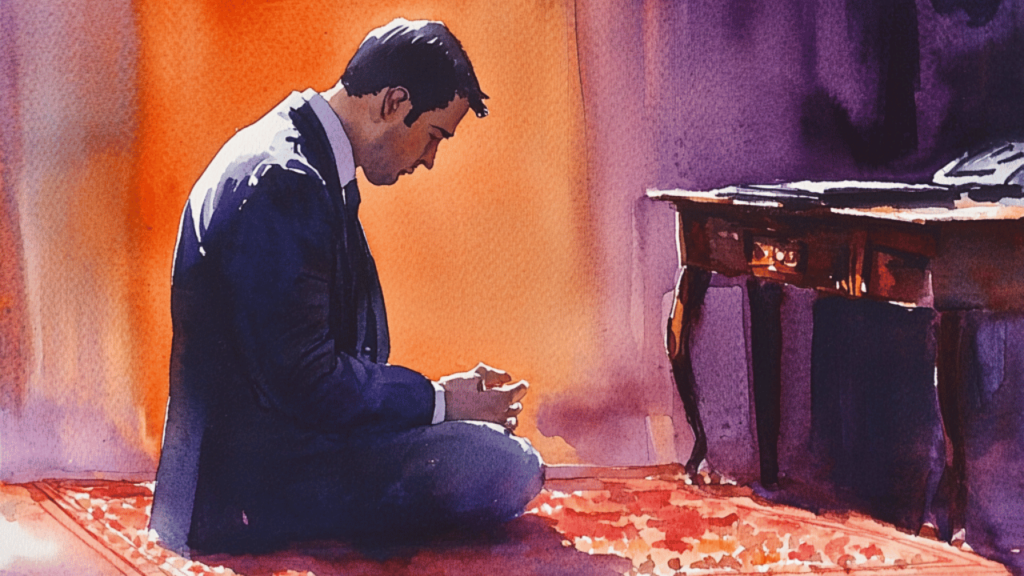Rachid is a computer engineer in a large company. He has a habit of performing his daily prayer in his office during his lunch break. Today, he is surprised by a colleague who complains to his supervisor. Rachid wonders what risks he faces and if he can be fired for this.
What does the law say?
During working hours, an employee must perform the tasks for which they were hired. Thus, an employer can object to an employee praying during working hours.
The Paris Court of Appeal approved reproaching an employee for praying during working hours (CA Paris, June 17, 2014, No. S 10/01020; CA Paris Oct. 11, 2017, No. 16/01757).
However, what about during the employee’s break time?
Article 3121-16 of the Labor Code states that: “As soon as the daily working time reaches six hours, the employee is entitled to a break of at least twenty consecutive minutes”.
During their break time, employees can, in principle, engage in personal activities.
An employee can therefore pray during their break time, provided that it does not interfere with the work of other employees. Indeed, the religious practice of the employee within the company must be compatible with their schedule, respect for the workplace, and the tasks assigned to them (CA Douai, May 31, 2016, No. 14/03708).
What are the rights and duties of the employer?
The employer has the power to implement rules within the company and to take disciplinary action against employees. However, Articles L. 1121-1 and 1321-3 of the Labor Code require that any restrictions on individual or collective freedoms be objective, justified by the nature of the task to be performed, and proportionate to the aim pursued.
- The employer can adjust work schedules according to the constraints of their employees, but they are not obligated to do so. Indeed, the organization of working time falls under the employer’s management authority.
- An employer is free to accept or refuse to provide a prayer room in the company if one or more employees request it.
When the employer restricts the freedom to pray, they cannot do so for a particular religion. Such a restriction must apply to all beliefs, otherwise it would be discriminatory.
An employee cannot be discriminated against because of their religious beliefs. Articles 225-1 and 225-2 of the Penal Code punish and define discriminatory practices as “any distinction made between individuals on the basis of (…) their belonging or non-belonging, real or supposed, to an ethnic group, a Nation, a supposed race or a specific religion“.
Art. L. 1132-1 of the Labor Code: “No person may be excluded from a recruitment procedure or access to an internship or a period of training in a company, no employee may be sanctioned, dismissed or subjected to a discriminatory measure, direct or indirect, as defined in Article 1 of Law No. 2008-496 of May 27, 2008 on various provisions for adaptation to Community law in the field of anti-discrimination, particularly in terms of remuneration, within the meaning of Article L. 3221-3, of profit-sharing measures or distribution of shares, training, reclassification, assignment, qualification, classification, professional promotion, transfer or contract renewal because of (…) their religious beliefs, physical appearance, surname, place of residence or because of their health status or disability.”
What should I do?
- If you do not have an office, you should first request permission from your employer to ask for a space in the workplace to pray.
- The simple request to pray cannot constitute gross misconduct, namely the intention to harm the company.
- If you are called to a preliminary interview that could lead to dismissal, you should prepare for it and attend accompanied.
- If you are dismissed on this basis, it should be contested. The deadline for referring to the Labor Court is 12 months from the notification of the termination of the employment contract, and the employee has 15 days to ask their employer for the reasons for the dismissal.
- Article 1134-5 of the Labor Code provides that the action for compensation for damage resulting from discrimination recognized in the Labor Code is subject to a limitation period of 5 years from the revelation of the discrimination.
- Finally, you can contact Equitas, which will provide you with the necessary assistance in your proceedings.




